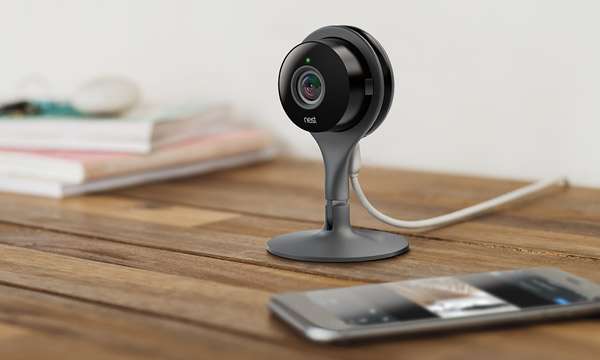November 27, 2015 weblog
Nest Cam not fully powering down but stops transmitting video to cloud at turnoff

At ABI Research, a teardown team did tests and found that the Nest Cam security camera's LED power did turn off when users did the power-down command, but the device itself was still on and running.
Jim Mielke, Vice President of Teardowns, said "It appears Nest Cam is working around the clock."
"When a device goes to power down mode, you expect the current drain to drop quite a bit," said Mielke. "In this case, the current drain only changed slightly when given the turn off command, reducing from 370mA to 340mA. Typically a shutdown or standby mode would reduce current by as much as 10 to 100 times."
Nest launched its security camera as part of its revamped smart home product line in June.
"Say hello to Nest Cam," said the announcement page on the Nest site. This was designed to be a step up from Dropcam introduced to the Nest family last year. "Now we've taken all the best parts of Dropcam and made them even better."
The Nest Cam offers 1080p HD video, sharp enough to see details from across the room, and advanced night vision. The Nest Cam performs as eyes and ears when people are away from their residence; it allows users to see a live video feed of their home remotely, via their smartphone, said the BBC.
Its motion and audio sensors pick up unusual activity, alerting users via notifications. "In our review, it earned high praise," said Chris Smith in TrustedReviews, "for the excellent image quality at day or night and reliable motion sensors."
The BBC picked up on the researchers' report on Wednesday, telling readers about the findings: "When the camera is disabled via the Nest smartphone app, the device's light-emitting diode (LED) turns off but the camera continues to function."
The BBC added that the team at ABI Research "found that even when in 'off' mode, the camera on the Nest Cam continued to draw a current of 340 mA, indicating that it was, in fact, still operational."
Google-owned Nest responded. The camera does not fully power down but no video data was transmitted when the camera was off. Turn the phrasing another way and it's still the same. The cameras do not record video when switched off even though they keep drawing an amount of current after being told to turn off.
"When Nest Cam is turned off from the user interface (UI), it does not fully power down, as we expect the camera to be turned on again at any point in time," the company said in a statement.
"With that said, when Nest Cam is turned off, it completely stops transmitting video to the cloud, meaning it no longer observes its surroundings."
As for security, "The statement added that the Nest Cam used 128-bit secure sockets layer (SSL) encryption, perfect forward secrecy and a 2,048-bit RSA key unique to each camera—security measures intended to ensure that video data is not accessible, even over the local wi-fi network," said the BBC.
Shaun Nichols in The Register also wrote about the Nest reply. "Nest denies its hardware is always watching, saying that the home surveillance camera does in fact stop recording when it is powered off. Rather, the Google stablemate claims, the gizmo has to keep pulling current so it can wake up and record video at a moment's notice when asked to, rather than waste time powering up from cold and reconnecting to the internet."
From TechWeekEurope: Nest said that when the device is switched off, it does remain in a state of readiness, but no longer transmits video.
More information: www.abiresearch.com/press/nest … -works-around-clock/
© 2015 Tech Xplore


















